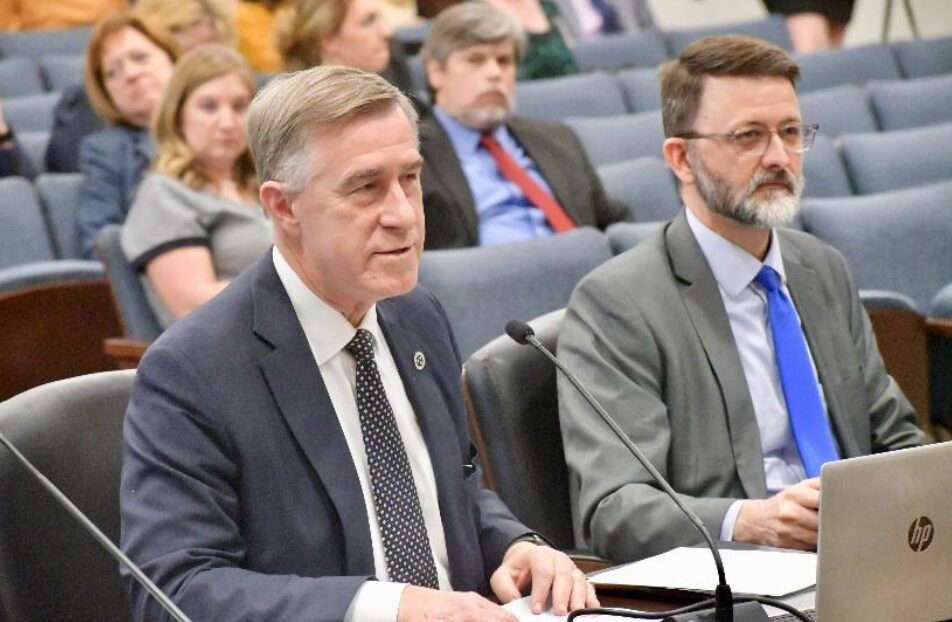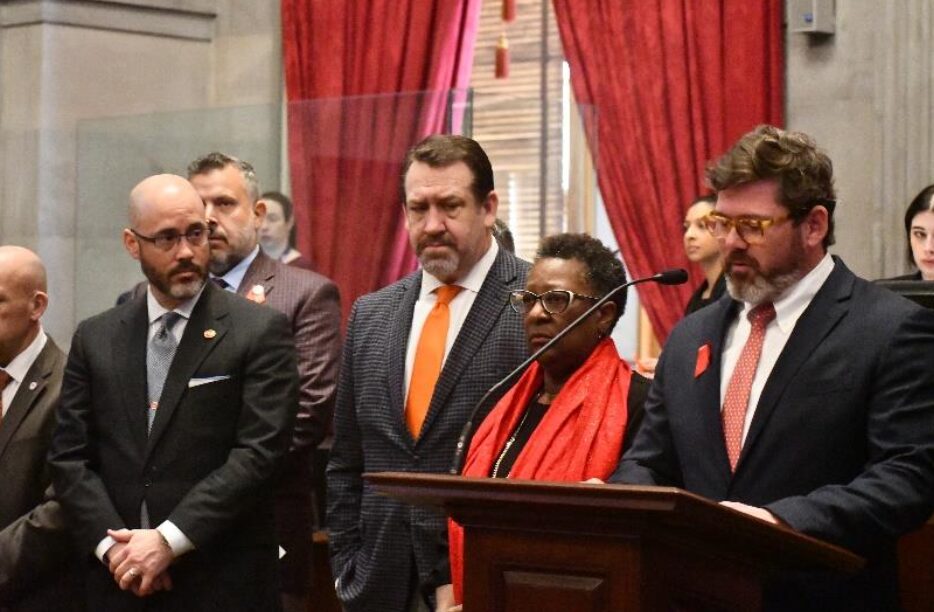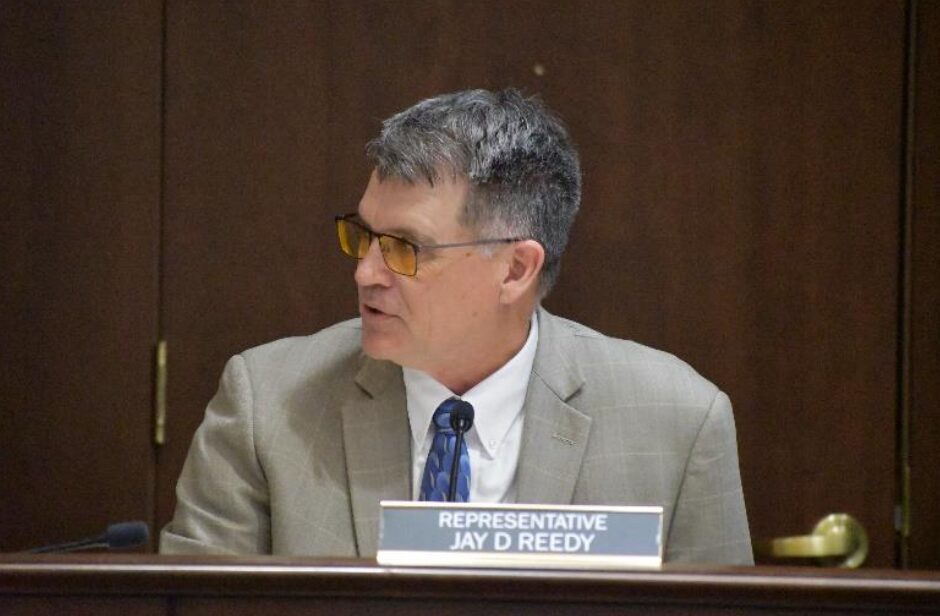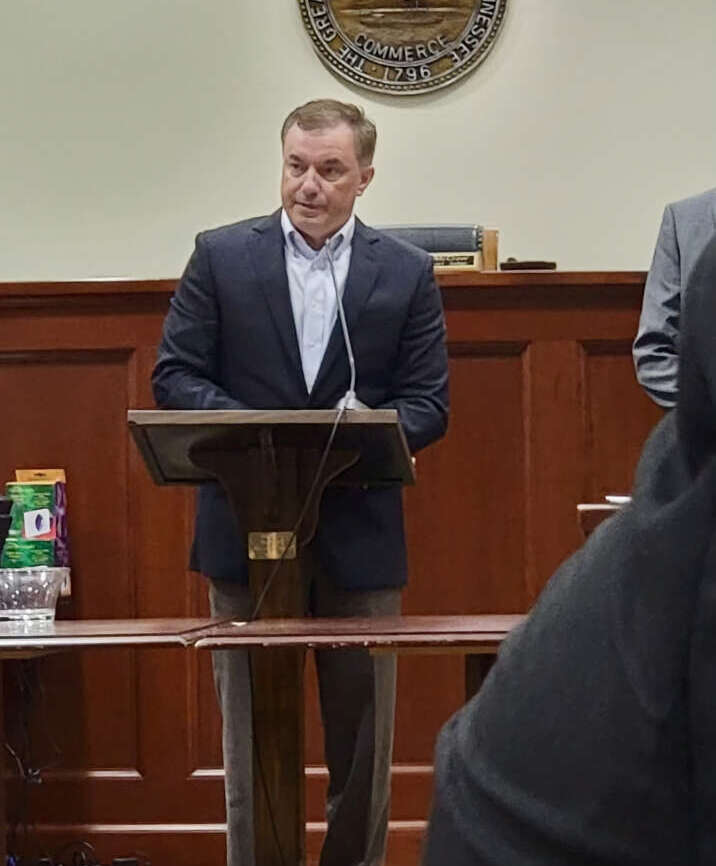Budget becomes central focus in final weeks of 113th General Assembly
Members of the House Finance, Ways and Means Committee this week were briefed by Finance and Administration Commissioner Jim Bryson on Gov. Bill Lee’s amended budget proposal for the 2024-25 fiscal year.

“We’ve been really managing our expenses to stay significantly under our revenues,” Bryson told members of the committee. “That is just good conservative management.”
“Our challenge is to take care of problems this year and deal with things now and try to set ourselves up to have a… more normal (budget next year),” he added, highlighting the state’s stabilizing tax revenue collections following several years of dramatic growth.
The budget amendment includes funding for several key pieces of legislation that aim to increase public safety in Tennessee.
House Bill 1640, also known as Jillian’s Law, would require criminal defendants deemed incompetent to stand trial to be committed to an appropriate treatment facility. The legislation, sponsored by House Majority Leader William Lamberth, R-Portland, additionally requires those individuals to be entered into the National Instant Criminal Background Check System, which serves as a namecheck database of people prohibited from buying or owning firearms.
Another bill, House Bill 1643, directs $3.3 million for mental health evaluations and treatment for a defendant charged with a misdemeanor when there is a question about their mental capacity at the time of the offense.
“Mental health issues are the root cause of many crimes,” Lamberth said. “These measures provide a proven, practical approach to crime prevention by ensuring people who are a danger to society receive appropriate evaluation and treatment.”

The budget amendment also includes $85,000 to fund legislation filed by State Rep. Kirk Haston, R-Lobelville, that will indefinitely extend the requirement for school districts and public charter schools to provide every high school senior with the opportunity to take nationally recognized career readiness assessments.
Other investments include $10 million for the Nuclear Energy Fund to support the state’s nuclear development and manufacturing ecosystem; $6.5 million for a new dental training clinic in Kingsport; $6.4 million for the deployment of the Tennessee Army National Guard to support ongoing border security efforts; and $5 million for volunteer firefighter equipment grants.
The state’s Rainy Day Fund would also receive an additional $130 million investment, bringing its total to $2.2 billion. An approximately $400 million franchise tax cut to support Tennessee’s economy was previously included in the proposed budget.
Additionally, there would be $33 million for the General Assembly to use at its discretion to fund various other pieces of legislation and appropriations.
“This has been a tough year in a lot of ways…,” Bryson told lawmakers Tuesday. “We’ve kind of come to a screeching halt (with revenue collections), but because of the wise planning during the good years, we are in great shape this year to do all the things that we need to do in order to have ourselves in a good place for next year.”
The House Finance, Ways and Means Committee in the coming weeks will thoroughly study the details of Gov. Lee’s proposed $52.78 billion budget along with the new additions.
The Republican supermajority is committed to passing a fiscally conservative, balanced budget that includes strategic investments in key areas that meet the needs of all Tennesseans.
House honors Covenant victims, advances bills improving school safety

The House chamber paused on Thursday to remember the victims of the Covenant School shooting one year after the horrific tragedy that claimed six innocent lives. House Joint Resolution 1142 honors the memories of the three students and three adults who were killed – Evelyn Marie Dieckhaus, Hallie Scruggs, William Kinney, Dr. Katherine Koonce, Cynthia Broyles Peak and Michael “Mike” Hill. The Metro Nashville Police Department, the Nashville Fire Department, and the Nashville Department of Emergency Communications 911 staff were also commended.
The Covenant tragedy turned a heavy spotlight on school safety in the Volunteer State. Since 2018, Republicans have invested more than $780 million to make Tennessee public schools safer.
Republicans in 2024 continue to build on the investments. Most notably, these measures build on investments made through the School Safety Act of 2023, which enacted a multi-tiered plan and provided a school resource officer for every public school. The General Assembly also approved $30 million for safety grants for higher education institutions during the special session on safety in August 2023.
Bills advancing this week include:
School de-escalation training: House Bill 1633requires de-escalation training for teachers and administrators in Tennessee. The legislation, sponsored by State Rep. John Ragan, R-Oak Ridge, would ensure school personnel receive the training annually beginning in the 2024-25 academic year. A report last year from the Tennessee Comptroller’s Office of Research and Education Accountability found that over the last 25 years, 43 percent of shootings that occurred at Tennessee schools were due to the escalation of a dispute.
Increasing availability of SROs: Currently, more than 500 public schools are without a school resource officer (SRO), even though the state provides funding for an SRO in every Tennessee public school. To alleviate this safety risk, State Rep. Clay Doggett, R-Pulaski, is sponsoring legislation that would help fill this gap and provide more schools with equipped officers.
House Bill 2682 would allow a retired law enforcement officer who is a member of the Tennessee Consolidated Retirement System (TCRS) or local retirement fund to be reemployed as a full-time SRO at a Tennessee public school without loss or suspension of the officer’s retirement benefits.
Ensuring safe school traffic: Legislation sponsored by State Rep. Michael Hale, R-Smithville, aims to protect children from traffic during busy school transportation hours is expected to be heard in Finance, Ways and Means. House Bill 1623 would allow counties to hire employees or use volunteers to direct vehicles within a marked school zone. Anyone who served as a traffic director would be required to undergo training and use the appropriate safety apparel and equipment. This legislation would also authorize counties to close roads within certain hours of the day for easier and safer pickup and dropoff zones.
Passed in the Senate chamber and is expected to be heard in the Finance, Ways and Means Committee.
Blue light emergency phones on college campuses: To enhance safety measures on college campuses, Tennessee higher education institutions have blue-light emergency phones, which connect callers directly to emergency services. State Rep. Dale Carr, R-Sevierville, is sponsoring legislation to further protect students by mandating all calls made from those emergency phones be recorded. House Bill 1874 is expected to be heard next week in the Finance, Ways and Means Committee.
Improving student safety on college campuses: To ensure college students in Tennessee can protect themselves on campus without facing criminal charges awaits approval in the Senate chamber. House Bill 1909 by State Rep. Gino Bulso, R-Brentwood, clarifies it is not a crime for adults to carry certain non-lethal weapons in most buildings, recreation areas and other facilities on public college campuses. The bill specifies that non-lethal weapons include pepper spray, a pepper spray gun, pepper gel, mace, an electronic control device, a stun gun or other conducted energy device.
Increasing private school safety: House Bill 1631, by State Rep. Gino Bulso, R-Brentwood, helps to increase safety at private schools in Tennessee. Existing state law only allows K-12 private schools to establish a handgun carry policy. House Bill 1631 allows a private school with students in pre-kindergarten through 12th grade to adopt a handgun carry policy for its
campus. Both chambers have passed this bill and it now heads to the governor’s desk for his signature.
School alarm protocols: Recently signed by Gov. Bill Lee and now state law, House Bill 1644, by House Majority Leader William Lamberth, R-Portland, requires all public and private Tennessee schools to determine the cause of a fire alarm when activated. Lamberth filed the bill in response to discussions he had with the mother of Nashville Covenant School shooting victim William Kinney, 9. In a statement read by his mother during the August 2023 special session, Erin Kinney said many at the school believed there was a fire because the alarm ringing through the school masked the sound of gunshots. The bill requires schools to develop a safety response plan when an unscheduled fire alarm is activated. The goal is to help school personnel more quickly determine whether an emergency is a fire, inclement weather, or an active shooter situation. Teachers, students, staff and district employees must be made aware and trained to respond accordingly to a potential threat. Public Chapter 563
Bill supporting Tennessee’s music industry advances
The Commerce Committee this week advanced legislation that would increase support for the live music industry in Tennessee.
House Bill 2712, sponsored by House Majority Whip Johnny Garrett, R-Goodlettsville, creates the Live Music and Performance Venue Fund to provide grants for live music performances, venues, performers and promoters. The legislation also specifically defines the terms in state law.
“Our small venues are a very integral piece of the state and our music industry, and it’s important that we support their efforts,” Garrett said.
While similar funds have already been established across the nation, Tennessee would become only the second state to define what a live music and performance venue is if the legislation was approved. House Bill 2712 is scheduled to be heard in the Government Operations Committee on April 1.
Grants to support rural school partnerships for CTE programs proposed
The General Assembly is considering legislation that aims to provide more career and technical education (CTE) opportunities for students in rural parts of the state.
House Bill 849, also known as The Rural Schools Innovation Act, would create a two-year pilot program to provide grants to rural school districts for the expansion of CTE programs in their high schools.
“The idea is that instead of one school offering three or four average CTE programs, schools can partner with each other and have two great, quality programs,” said bill sponsor State Rep. Kirk Haston, R-Lobelville.
The bill establishes $3 million for grant awards, subject to appropriations. The Department of Education would oversee grant applications and awards. One partnership from each region would be chosen to participate. The department would then study the effectiveness of the pilot program and submit its findings to the General Assembly. The proposal will be considered for funding at a later date due to the cost associated with the legislation.
Protecting Tennessee property from foreign adversaries
The Government Operations Committee this week advanced legislation further protecting property in Tennessee from being purchased by hostile foreign nations.
House Bill 2553, sponsored by State Rep. Jay Reedy, R-Erin, would prevent prohibited foreign parties designated by the federal government from owning or acquiring property in the state unless certain conditions were met. The proposed legislation repeals most of a similar law passed last year and replaces it with stricter protections and reporting requirements.

Any prohibited foreign party or business that currently owns land in the state would have to divest itself from the property within two years, according to the bill. The Office of Agriculture Intelligence would also be created within the Tennessee Department of Agriculture to collect data and analyze information regarding the unlawful sale or possession of agricultural land statewide.
Of the 26.4 million total acres in Tennessee, there were 427,288 acres of agricultural land and 434,268 acres of non-agricultural land owned by a foreign country or investor as of December 2020, according to a report from the U.S. Department of Agriculture.
House Bill 2553 is scheduled to be heard in the Finance, Ways and Means Subcommittee on April 3.
House approves Protecting Children from Social Media Act
The Tennessee House of Representatives this week approved legislation that restores parental authority online by requiring social media companies to verify the ages of account holders.

The Protecting Children from Social Media Act requires parental consent before a minor creates an account on a social media platform. It also gives parents a high level of access to supervise their child’s online interactions as well as the ability to revoke consent if necessary. The legislation was filed by State Rep. Jake McCalmon, R-Franklin, in partnership with Gov. Bill Lee’s administration.
“(This bill) does not apply to commerce platforms such as Amazon, Ebay or online auctions,” McCalmon said Monday. “It is simply putting the choice in the hands of parents (to decide) whether or not they want their kids on social media.”
Social media use has a “profound risk of harm” on young people, according to an advisory warning from the U.S. Surgeon General last year. Similar legislation requiring age verification on social media sites has already been approved in Arkansas, Louisiana, Texas and Utah.
The companion version of House Bill 1891 is still advancing through the Senate.
Tennessee farmland preservation legislation advances
Legislation aimed at protecting Tennessee farmland from non-agriculture related development advanced out of the Government Operations Committee this week.
House Bill 1890, carried by State Rep. Rusty Grills, R-Newbern, would create Farmland Preservation Fund to provide grants to property owners who place their farm or forestry land into an agriculture easement with the Tennessee Department of Agriculture.
“This legislation (will) protect one of our state’s most vital economic contributors, and that would be agriculture,” Grills said. “Currently, Tennessee is ranked third in the nation for lost land to nonagricultural development. To prevent future loss and to help support our farmers, the Farmland Preservation Fund would allow agriculture land owners to place their land into an agriculture easement… that states that their land will only be used for agriculture and agriculture-related development.”
Agriculture easements would last for at least 15 years, with the option for renewal, according to the legislation. Property owners would be paid the difference between the value of the land as restricted and the value for its highest and best use.
The proposed legislation would not prohibit farmers from building on their land for agricultural reasons or limit the level of agricultural output of the property. In Tennessee, agriculture-related industries employ 324,000 individuals and contribute $89 billion into the economy.
House Bill 1890 is scheduled to be heard in the Finance, Ways and Means Committee on April 3.
Republicans simplify franchise tax and return money to taxpayers
The House Finance, Ways and Means Subcommittee this week advanced legislation to cut $400 million in taxes by simplifying the state’s franchise tax, which is a tax on a business’s net worth. This adjustment will offer relief to taxpayers, modernize the way the tax is calculated, and manage newly discovered legal risks.
“Smart, conservative budgeting over the last decade has put our state in a strong fiscal position to offer equitable relief for businesses and modernize the way our tax structure is calculated,” said bill sponsor House Majority Leader William Lamberth, R-Portland. “This legislation will align Tennessee’s franchise tax with surrounding states. This amendment respects and upholds the public’s right to know by adding transparency about any rebates that may occur.”
House Bill 1893 will restructure Tennessee’s franchise tax to remove the property measure and authorize the Department of Revenue to issue refunds to taxpayers who have paid the franchise tax based on property located in the state.
A House amendment adds a requirement for any refunds distributed in accordance with this bill to be made public. It also allows companies who wish to stay under the current tax structure for the tax period ending before Dec. 31, 2023 to do so. If a business applying for a refund has also received economic credits or incentives from the Tennessee Department of Community Development, the credit amount would be applied to the refund first.
The refund eligibility window is now for tax periods that ended on or after March 31, 2022 and refund claims must be filed by Feb 3, 2025. For a business that received economic incentives or credits from the state through the Tennessee Department of Community Development, the credit received would apply toward the refund.
House Bill 1893 is expected to be heard for consideration in the full House Finance, Ways, and Means Committee on April 2.
Briefly…
Threats of violence: The House chamber this week unanimously approved legislation strengthening the punishment for threatening to commit mass violence on school property or at a school-related activity in Tennessee. House Bill 2198 would increase the crime from a Class A misdemeanor to a Class E felony. The legislation includes an exception for individuals with an intellectual disability. The companion version of the bill is still advancing in the Senate. If approved, the new law would take effect July 1.
Human trafficking: The Criminal Justice Subcommittee this week advanced legislation that would ensure the prosecution of human trafficking crimes in Tennessee. House Bill 2611, sponsored by State Rep. Jason Zachary, R-Knoxville, would allow state or local law enforcement to petition another district attorney to prosecute a multi-jurisdictional human trafficking case if one district attorney declines to pursue charges. The legislation is scheduled to be heard in the Criminal Justice Committee on April 2.
Child custody: The House chamber this week unanimously approved legislation increasing protections for children during child custody cases. House Bill 2760, sponsored by State Rep. Rebecca Alexander, R-Jonesborough, requires a court to also consider evidence of physical or emotional abuse to a child’s siblings when making child custody decisions. Judges involved in the cases must also receive training based on evidence-based research that is given by a judge, retired judge or professional with experience with domestic violence, child abuse or child sexual abuse cases. The legislation also prevents the restoration of parenting time to a parent or caregiver of a child unless a court finds the child will not be exposed to further abuse or harm. The companion version of House Bill 2760 is still advancing through the Senate.
State songs: The General Assembly this week approved House Bill 1613 designating “Rockin’ Around the Christmas Tree” by Brenda Lee as the official holiday song of Tennessee. Earlier this month, lawmakers approved House Bill 2006, sponsored by State Rep. Kirk Haston, R-Lobelville, which adds “Tennessee, Tennessee” by Wayne Jerrolds to the list of official state songs. Tennessee currently has more than a dozen state songs. Both bills will now go to Gov. Bill Lee’s desk to be signed into law.
Bullying: The House chamber this week passed legislation that aims to further protect Tennessee students from bullying and cyberbullying. House Bill 2590, sponsored by State Rep. Lowell Russell, R-Vonore, classifies bullying and cyberbullying as forms of harassment, strengthening the penalty to a Class A misdemeanor in some instances. It also requires law enforcement to file a report if the victim is a minor, and notify the child’s parent or guardian of the incident. The companion version of the bill is still advancing through the Senate.
Textbook accessibility: Legislation ensuring students have reasonable access to necessary classroom materials passed unanimously in the House chamber this week. House Bill 2177, sponsored by State Rep. Susan Lynn, R-Mount Juliet, requires schools that provide electronic textbooks and instructional materials to students to also provide a physical copy if the child’s parent requests it. The companion version of the legislation is still advancing through the Senate.
Opportunities for engineers: The General Assembly this week approved legislation expanding opportunities for engineers in Tennessee. House Bill 2578, sponsored in the House by Deputy Speaker Curtis Johnson, R-Clarksville, will allow graduates of a four-year unaccredited engineering technology program to become a certified engineer if certain requirements are met. The legislation has a sunset date of June 30, 2025. It now heads to Gov. Bill Lee’s desk to be signed into law.
Driver services: The General Assembly this week passed legislation easing the hardship license application process for rural Tennesseans. House Bill 2766, sponsored by State Rep. Rusty Grills, R-Newbern, allows Tennesseans who live at least 30 miles from a driver services center to complete classroom training online for a Class H or hardship license. The legislation will now head to Gov. Bill Lee’s desk to be signed into law.
United Nations: The State Government Committee this week advanced a resolution calling for an American withdrawal from the United Nations. House Joint Resolution 849, sponsored by State Rep. Dennis Powers, R-Jacksboro, urges the U.S. Congress and President Joe Biden to withdraw from the U.N. and instead strengthen ties with the North Atlantic Treaty Organization (NATO). The resolution is scheduled to be heard in the House chamber on April 1.
Swatting: The House chamber this week approved legislation that would increase protections against the intentional false reporting of emergencies in Tennessee, often referred to as “swatting.” House Bill 2395, sponsored by State Rep. Elaine Davis, R-Knoxville, adds active shooter or hostage situations to the Class C felony offense of intentionally circulating a false emergency report. It is already illegal under state law to intentionally make a false report regarding a past, present or future bombing or fire. The companion version of the legislation is still advancing through the Senate.
Zoning: The Local Government Committee this week discussed legislation that would increase protections for Tennesseans who wish to grow their own vegetables or raise chickens or rabbits on their property. House Bill 1850, sponsored by State Rep. Jay Reedy, R-Erin, would prevent local governments from adopting or enforcing ordinances that prohibit gardening and raising limited numbers of chickens or rabbits at single-family residences. Local governments can impose reasonable regulations on such activities, but they cannot ban them. The legislation exempts condominium associations, co-ops, homeowners’ associations and other entities organized by restricted covenants and governing documents. The legislation was deferred to summer study for further consideration.
State books: A bill designating several pieces of literature with ties to Tennessee as official state symbols will now head to Gov. Bill Lee’s desk to be signed into law. House Bill 1828, sponsored by State Rep. Gino Bulso, R-Brentwood, designates ten different works with historic, social and cultural importance to the Volunteer State as the first official state books, including the Aitken Bible; “Farewell Address to the American People” by George Washington; “Democracy in America” by Alexis de Tocqueville; “The Papers of Andrew Jackson”; “Roots” by Alex Haley; “A Death in the Family” by James Agee; “All the King’s Men” by Robert Penn Warren; “American Lion” by Jon Meacham; “The Civil War: A Narrative” by Shelby Foote; and “Coat of Many Colors” by Dolly Parton. The legislation was approved this week by the Senate chamber after previously being passed in the House last month.
Unemployment rate: The Tennessee Department of Labor and Workforce Development this week reported the seasonally adjusted unemployment rate for the state decreased to 3.3% in February.
- The unemployment rate decreased in all 95 counties last month
- Moore County reported the lowest unemployment rate at 1.9%
- Cocke County had the highest rate at 4.7%
- The seasonally adjusted unemployment rate for the U.S. increased from 3.7% to 3.9% during the same time period
Tennessee’s Labor Force Estimates report for February can be found here.
State offices will be closed on Friday, March 29 in observance of Good Friday.


